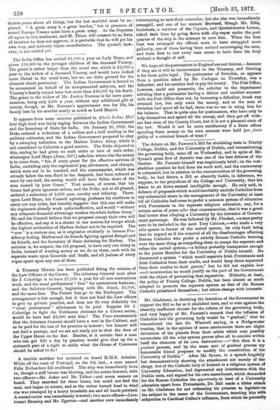The debate on Mr. Fawcett's Bill for abolishing tests in
Trinity College, Dublin, and the University of Dublin, and reconstituting the governing body, came off on Wednesday, and in spite of Mr. Syuan's great flow of rhetoric was one of the best debates of the Session. Mr. Fawcett himself was suspiciously brief ; on the test. abolition question he had done his work well, and the controversy is exhausted, but in relation to the reconstruction of the governing body, he had drawn a Bill so absurdly feeble, in deference, we suppose, to the prejudices of the College and University, that his desire to sit down seemed intelligible enough. He only said, in defence of proposals which would inevitably exclude Catholics from any substantial share in the management of the University at least till all Catholics had come to prefer a common system of education with Protestants to the separate religious education, nay, for a certain series of years after that consummation, that it was a great. deal better than alloying a University by the intrusion of Govern- ment patronage. He was followed by Mr. Plunket, —a man pretty sure to be included in the next Tory Cabinet,—who made a very able speech in favour of the united system, its only fault being that he argued as if the removal of all the disadvantages affecting Roman Catholics who prefer a strictly Roman Catholic training were the same thing as compelling them to accept the separate and refuse the united system,—a fallacy probably transparent enough to the junior Member for the University of Dublin himself. He denounced a system "which would separate Irish Protestants and Irish Catholics from their cradle, and would keep them separated from their cradles to their graves," but he did not explain how much intervention he would justify on the part of the Government with the object of preventing that separation. Hitherto, at least, the policy of Trinity College, Dublin, has been almost as much adapted to promote the separate system as that of the Roman Catholic priesthood themselves ; but ethics change with interests."


































 Previous page
Previous page